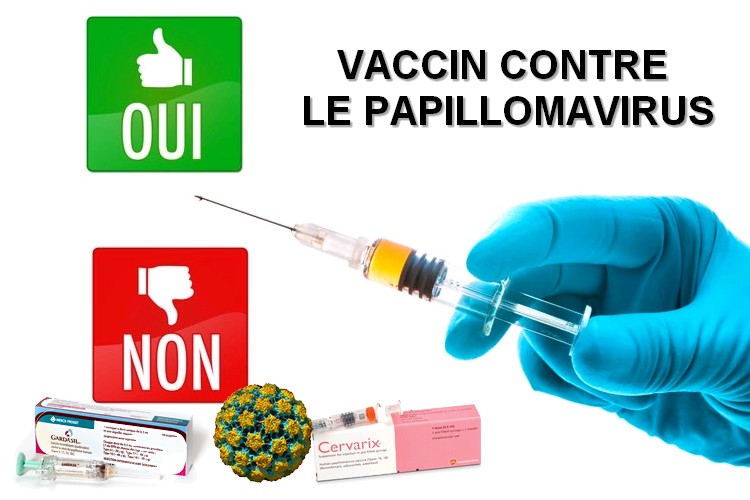For several weeks now, an appeal from Professor Joyeux, oncologist and surgeon at the Montpellier Cancer Institute, has been circulating on the Internet. The latter is alerting us to the recent report by the High Council for Public Health, which recommends mass vaccination in schools against papillomavirus (HPV), and lowering the vaccination age to 9 for girls and boys (11 years old until now). Professor Joyeux’s message is clear: it is IRRESPONSIBLE to vaccinate children and anyone not considered at risk of HPV. He invites us to sign a petition to ask for a moratorium on this measure. Professor Joyeux is not alone. Many specialists have been opposing or questioning the side effects of these vaccines for many years. Why such a position?
Some elements to better understand HPV:
-
existing vaccines only protect against certain risk factors, not against cancer itself
The vaccine against human papillomavirus infections is recommended by the health authorities to reduce the risk of cervical cancer. Indeed, some cervical cancers are linked to papillomaviruses (genotypes 16 and 18 in particular, responsible for precancerous lesions of the cervix). Two types of vaccine are currently used: GARDASILÒ (Merck Laboratory, marketed by Sanofi-Pasteur – quadrivalent vaccine, i.e. directed against papillomaviruses of genotypes 6, 11, 16 and 18, considered responsible for 70 to 84% of cases of cervical cancer, according to the manufacturer) and CERVARIXÒ (GlaxoSmithKline – bivalent vaccine against genotypes 16 and 18). Only a few strains are targeted, and the vaccines do not protect against many other genotypes that are equally implicated in cervical cancer.
-
a common and mostly benign virus
While the correlation between high-risk HPV and cervical cancer is not in question, 90% of infections are asymptomatic and recover without treatment. This virus is found in 80% of men and women. This virus is therefore common. The mortality rates and especially the age of deaths (mostly between 75 and 79 years old) linked to cervical cancer do not justify the alarmist speeches of the manufacturing laboratories, which target teenagers and young women in particular. Cervical cancer represents 0.7% of all cancer deaths in France, all sexes combined, in 2011.
-
existing vaccines, made from GMOs, have side effects that are still unknown but nevertheless worrying.
The two vaccines mentioned above, both resulting from genetic manipulation, are composed of numerous adjuvants: 225 mg of aluminium, polysorbate 80 suspected of rendering the vaccine sterile, carcinogenic and mutagenic, and sodium borate, considered to be a poison for GARDASILÒ, and for CERVARIXÒ500mg of aluminium and ASO4 composed of aluminium salts and monophosphoryl lipid A, suspected of inducing certain autoimmune diseases. Numerous doctors’ reports have urged caution with regard to these two vaccines. Patients and citizens’ associations directly incriminate these vaccines in serious cases of pathologies declared following the injections, notably autoimmune diseases. In any case, there is a lack of clear information on the possible side effects of these vaccines.
-
contested studies and figures, colossal financial stakes
Each injection costs about 123 euros, 65% of which is reimbursed by the French Social Security. Two or three injections at intervals of a few months are necessary depending on the age of the subject. According to the laboratories, protection is estimated at between 5 and 6 years. These figures, contested by many scientists, point to the lack of hindsight in the studies, as well as their partiality (independent studies are lacking to date). The cost of vaccination would amount to 926 million euros over a period of 3 to 5 years. The cost of a generalized smear test for the entire population, excluding the cost of the medical visit, would amount to 87.8 million euros…!
-
while many countries are calling for a moratorium, France is stubbornly refusing to do so
Germany, Australia, Norway, Switzerland, Canada and Japan (June 2013) have requested a moratorium. In Spain and the UK, there are voices against widespread HPV vaccination. In France, Pr Béraud and Dr de Chazournes have been issuing warnings and calls for a moratorium for several years. Professor Joyeux’s recent appeal is another call for action.
-
a certain risk, a benefit that is much less certain
It is now clearly established that cancer is a multifactorial disease involving heredity, lifestyle and environment. Vaccinating young children, at an age when the risk is reduced, with a real probability of adverse effects, for what reason? Smear tests, according to the scientific community, are still the best way to prevent cervical cancer. To conclude, this reflection by Dr Martin Winckler: ” This is the very essence of ethical reflection: before proposing a therapeutic method, we must ensure that this method is not only more effective than previous existing methods, but also that it does not pose any greater danger. In the case of HPV vaccination, we know that it is no more effective than a smear test (which is still essential) and we are unaware of its dangers. Once again, this is a real public issue. So, let’s do our research and think about it to make your health choices.
Delphine L., naturopath





